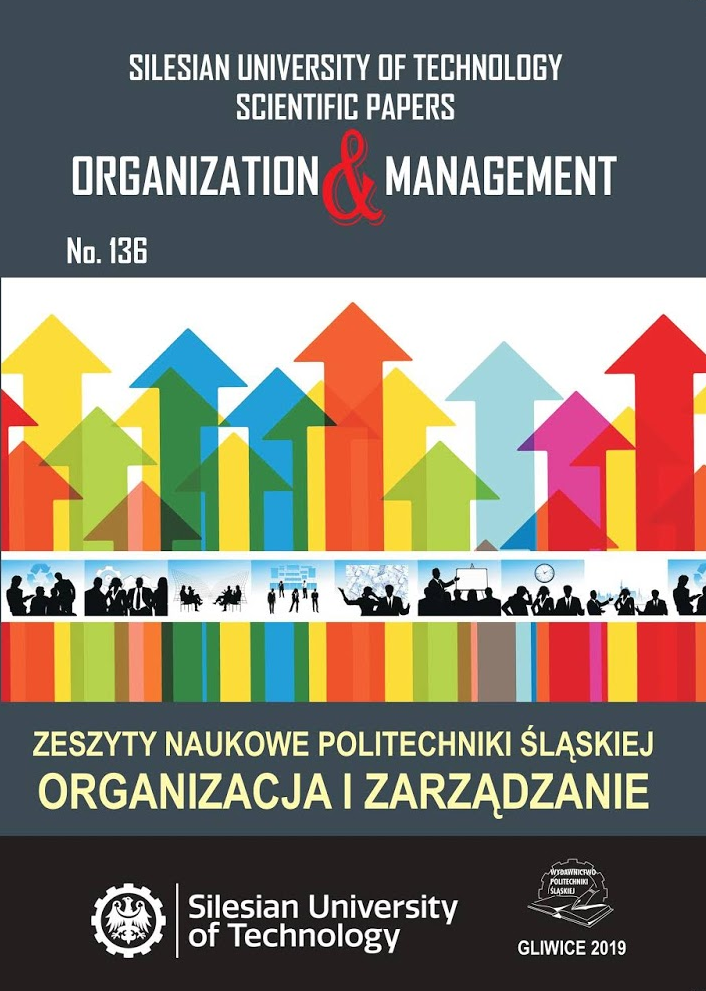Scientific Papers of Silesian University of Technology – Organization and Management Series – Issue No. 136

Insert
Table of Contents
Foreword
1. Jolanta BARAN – Life cycle approach-based methods – overview, applications and implementation barriers
http://dx.doi.org/10.29119/1641-3466.2019.136.1
2. Piotr BAROSZ, Marta DUDEK-BURLIKOWSKA, Mariola DŹWIGOŁ-BAROSZ, Marek ROSZAK – Organizational aspects for perfecting production processes based on the analysis of changes using the OEE indicator
http://dx.doi.org/10.29119/1641-3466.2019.136.2
3. Agnieszka Izabela BARUK – The assessment of previous relationships with offerors vs their perception as initiators of the prosumer activity of final purchasers
http://dx.doi.org/10.29119/1641-3466.2019.136.3
4. Jerzy BARUK – Selected aspects of innovativeness in Polish enterprises
http://dx.doi.org/10.29119/1641-3466.2019.136.4
5. Bernard BIŃCZYCKI – Modern corporate ethics programs. Ferrero group case study
http://dx.doi.org/10.29119/1641-3466.2019.136.5
6. Marek BUGDOL, Tomasz JEMCZURA – Customer satisfaction in retail banking – current and future research trends
http://dx.doi.org/10.29119/1641-3466.2019.136.6
7. Anna CIERNIAK-EMERYCH, Agata PIETROŃ-PYSZCZEK – Gamification as a tool to improve the level of occupational safety and health in the company
http://dx.doi.org/10.29119/1641-3466.2019.136.7
8. Henryk DŹWIGOŁ – Restructuring as a determinant of systemic changes in the business development process
http://dx.doi.org/10.29119/1641-3466.2019.136.8
9. Mariola DŹWIGOŁ-BAROSZ – A university level educational offer for the ‘Y’ generation successors of Polish family firms – background
http://dx.doi.org/10.29119/1641-3466.2019.136.9
10. Barbara GALIŃSKA – The concept of an intelligent enterprise as a result of the convergence of logistics megatrends
http://dx.doi.org/10.29119/1641-3466.2019.136.10
11. Sandra GRABOWSKA – Industry 4.0 challenges for the business model
http://dx.doi.org/10.29119/1641-3466.2019.136.11
12. Michalene GREBSKI, Radosław WOLNIAK – Procedures for obtaining an engineering license in the USA and Canada
http://dx.doi.org/10.29119/1641-3466.2019.136.12
13. Marcin JAKUBIEC – Analysis of use of selected improvement instruments in university management systems
http://dx.doi.org/10.29119/1641-3466.2019.136.13
14. Adam JANISZEWSKI – Types of models of activities of knowledge brokers
http://dx.doi.org/10.29119/1641-3466.2019.136.14
15. Izabela JONEK-KOWALSKA – Improving cost management in a mining enterprise. Identification of the directions of necessary changes in the context of the current state diagnosis
http://dx.doi.org/10.29119/1641-3466.2019.136.15
16. Jarosław KACZMAREK – The effectiveness of working capital management strategies in manufacturing enterprises
http://dx.doi.org/10.29119/1641-3466.2019.136.16
17. Jadwiga KACZMARSKA-KRAWCZAK – Financing sources of the healthcare sector enterprises’ innovation activity in Łódzkie province
http://dx.doi.org/10.29119/1641-3466.2019.136.17
18. Monika KIEĆ, Marek BUGDOL – The application of selected quality toolsi n analysing the reasons for discrepancies in wet refractory mortar manufacture
http://dx.doi.org/10.29119/1641-3466.2019.136.18
19. Konrad KOLEGOWICZ, Paweł KRZEMIŃSKI – The influence of financial condition on investment decisions in enterprises in Poland
http://dx.doi.org/10.29119/1641-3466.2019.136.19
20. Marcin KOMAŃDA, Agnieszka DZIUBIŃSKA – The use of employees as experts in unusual situations: service SMES prospect
http://dx.doi.org/10.29119/1641-3466.2019.136.20
21. Paweł KOSIŃ – The stakeholders relationships management and the shareholders value maximization
http://dx.doi.org/10.29119/1641-3466.2019.136.21
22. Magdalena KRACZLA – Leadership styles as a mental representation in the context of personality skills
http://dx.doi.org/10.29119/1641-3466.2019.136.22
23. Teresa KRAŚNICKA, Izabella STEINEROWSKA-STREB –
Family involvement and innovation in family enterprises
http://dx.doi.org/10.29119/1641-3466.2019.136.23
24. Agnieszka KRAWCZYK-SOŁTYS – Professional and managerial competence enhancing organizational competences of emergency medical units http://dx.doi.org/10.29119/1641-3466.2019.136.24
25. Marcin KRZESAJ – Information quality problems on websites
http://dx.doi.org/10.29119/1641-3466.2019.136.25
26. Anna KWIECIEŃ – Relationships between enterprises and banks
http://dx.doi.org/10.29119/1641-3466.2019.136.26
27. Wojciech LEOŃSKI – Barriers of the implementation of corporate social responsibility in chosen enterprises
http://dx.doi.org/10.29119/1641-3466.2019.136.27
28. Anna LEWANDOWSKA-CISZEK – Selected aspects of risk management in the context of PRINCE2® methodology – as based upon a project implemented by an enterprise in the sector of industrial automation
http://dx.doi.org/10.29119/1641-3466.2019.136.28
29. Rafał MATWIEJCZUK – About the relationship between resources, capabilities and competences – the resource-based perspective
http://dx.doi.org/10.29119/1641-3466.2019.136.29
30. Krzysztof MICHALSKI, Artur GALIK – Reduction of defective products in the production of vibration damper
http://dx.doi.org/10.29119/1641-3466.2019.136.30
31. Radosław MIŚKIEWICZ– Industry 4.0 in Poland – selected aspects of its implementation
http://dx.doi.org/10.29119/1641-3466.2019.136.31
32. Michał MOLENDA – Assessment of chosen aspects of quality policy in selected industrial enterprises
http://dx.doi.org/10.29119/1641-3466.2019.136.32
33. Bogdan NOGALSKI, Przemysław NIEWIADOMSKI – Maturity of non-page motivation systems according to Poland’s machinery sector companies –
from management theory to practice
http://dx.doi.org/10.29119/1641-3466.2019.136.33
34. Anna PADLOWSKA – Professional activity of women in Polish enterprises
http://dx.doi.org/10.29119/1641-3466.2019.136.34
35. Jacek PASIECZNY, Maksym SITNICKI – Causes and consequences of organizational mismatches
http://dx.doi.org/10.29119/1641-3466.2019.136.35
36. Jakub PERLAK – Selected management concepts supporting self-organizing teams
http://dx.doi.org/10.29119/1641-3466.2019.136.36
37. Agata PIETROŃ-PYSZCZEK, Anna CIERNIAK-EMERYCH –
Improvement of the area of OSH in the enterprise – behavioural approach
http://dx.doi.org/10.29119/1641-3466.2019.136.37
38. Irena PYKA, Jan PYKA – Security management of systemically important banking institutions inside the European Union financial market
http://dx.doi.org/10.29119/1641-3466.2019.136.38
39. Marzena PYTEL-KOPCZYŃSKA – Idea of the best workplace in the context of improving team performance
http://dx.doi.org/10.29119/1641-3466.2019.136.39
40. Sebastian SANIUK – The concept of utilizing smes network e-business platforms for customised production in the Industry 4.0 perspective
http://dx.doi.org/10.29119/1641-3466.2019.136.40
41. Piotr SLIŻ, Martyna BRENNENSTUHL – Assessment of the process maturityof the organization on the example of the shared services centre – a case study
http://dx.doi.org/10.29119/1641-3466.2019.136.41
42. Marlena SMUDA-KOCOŃ – Value added of intellectual capital in banks and the hysteresis effect
http://dx.doi.org/10.29119/1641-3466.2019.136.42
43. Dorota SOBOL – The manager’s role in creating innovations in a knowledge-based enterprise
http://dx.doi.org/10.29119/1641-3466.2019.136.43
44. Jerzy STADNICKI – Optimization of the choice of technology within the spatial organization of production
http://dx.doi.org/10.29119/1641-3466.2019.136.44
45. Paweł SZEWCZYK – Application of blockchain technology in supply chain management
http://dx.doi.org/10.29119/1641-3466.2019.136.45
46. Małgorzata SZYMANSKA-BRALKOWSKA, Ewa MALINOWSKA – The use of selected Green Lean instruments to improve catering services
http://dx.doi.org/10.29119/1641-3466.2019.136.46
47. Krzysztof S. TARGIEL – Multicriteria support of project scheduling in programs
http://dx.doi.org/10.29119/1641-3466.2019.136.47
48. Marta TUTKO – Quality culture research in higher education – literature review
http://dx.doi.org/10.29119/1641-3466.2019.136.48
49. Piotr TWOREK, Rafał PORC – On the nature of risk and risk management in social welfare homes as public providers of social services in Poland
http://dx.doi.org/10.29119/1641-3466.2019.136.49
50. Jerzy WĄCHOL – Modern management methods and process organization in a global enterprise
http://dx.doi.org/10.29119/1641-3466.2019.136.50
51. Karolina WIELICKA-GAŃCZARCZYK – Factors affecting the image of hospitals – literature analysis
http://dx.doi.org/10.29119/1641-3466.2019.136.51
52. Radosław WOLNIAK – Main problems of business enterprise internationalization
http://dx.doi.org/10.29119/1641-3466.2019.136.52
53. Katarzyna ZADROS – Man as the subject of management – in the opinion of students of Economy 4.0
http://dx.doi.org/10.29119/1641-3466.2019.136.53
54. Czesław ZAJĄC – Human capital management of contemporary enterprises.Threats and opportunities
http://dx.doi.org/10.29119/1641-3466.2019.136.54
55. Katarzyna ŻĄK – Implementation of corporate governance principles compliant with OECD standards in public companies in Poland and Hungary
http://dx.doi.org/10.29119/1641-3466.2019.136.55
